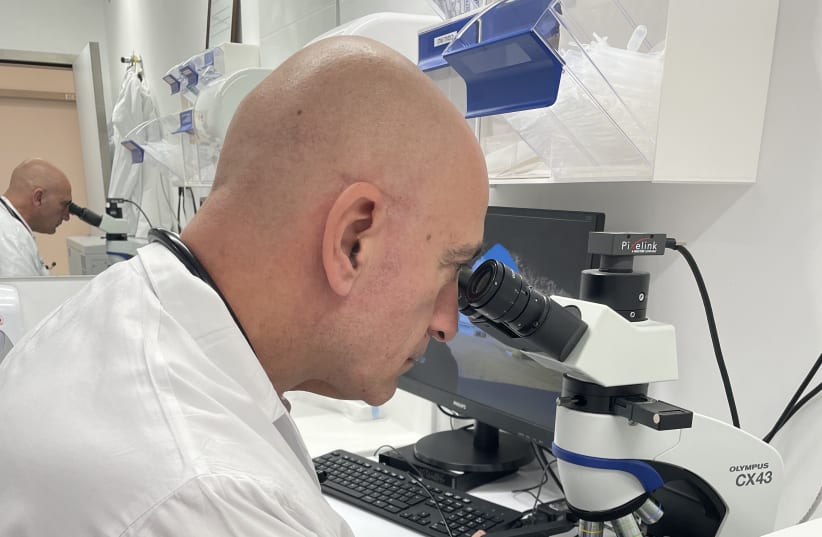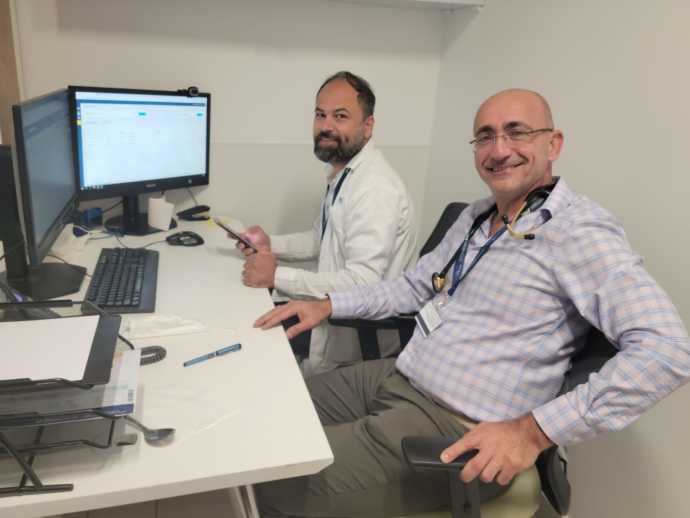An Israeli public hospital located only 21 kilometers from the Gaza border that regularly treats the victims of Palestinian terrorist attacks has launched a virtual clinic for Arabs from the Palestinian territories.
Samson Assuta Ashdod University Hospital opened the clinic this past summer, using advanced telemedicine technologies to treat Palestinians over the internet. Now, it is also bringing patients from the West Bank and Gaza into the hospital.
“No matter what the political situation or how much tension, we are persistent in the fact that we want to bring health to everyone,” said Prof. Adi Leiba, head of Assuta’s Nephrology and Hypertension Institute and deputy director of the hospital. “Politics remain outside the walls of the hospital. We work to provide the best medical care we can to every person.”
Leiba founded the clinic with his Palestinian colleague, Dr. Yahya Jaber, a resident of Bethlehem. Before joining Assuta three years ago, Leiba served as a senior officer in the IDF Medical Corps, positioned in the West Bank.
“While in the IDF, I thought it would be wise to serve not only the soldiers and the Israelis who lived in the area, but also the Palestinians,” Leiba said. “So, I started building connections with Palestinian doctors.”
Leiba nurtured those relationships until he was able to start the new clinic at Assuta in collaboration with Project Rozana. The Project is an international non-profit that works to build better understanding between Israelis and Palestinians through health-related efforts.
The Assuta clinic is unique because it covers any and all fields of medicine, with care tailored to the needs of each patient.
A phone line is manned by Jaber, who was trained in the Ukraine and speaks Arabic, Hebrew and Russian. Jaber, 35, has been working with Assuta for five years and knows the doctors who work there well. When a patient phones in, Jaber screens the call to obtain an understanding of the caller’s needs. Then, working with a coordinator, he sets up an appointment. He also can consult directly with colleagues to help ensure that patients get the right treatments.
Additionally, the focus on video-based care using the latest technologies makes it easier for Palestinians to take advantage of the program. For those who want to come physically to the hospital, special permissions can be arranged with the help of Assuta.
“There are many patients who want to receive the high-quality care offered by the Israeli health system but until now they could not,” Jaber explained. “The health care provided by the Palestinian Authority is not good like it is in Israel. We want to help them.”
According to a 2022 report by the World Health Organization, the Palestinian population totals 5.35 million people, including 3.18 who live in the West Bank and East Jerusalem and 2.17m who live in the Gaza Strip. The majority (70%) of Gazans are considered refugees, while just under one-third of West Bank residents have refugee status.
There are an additional 3.4 million Palestinian refugees living in Jordan, Lebanon and Syria, the report said.
Ninety percent of Palestinians who consider themselves refugees living in the West Bank and 100% of refugees living Gazans report that their children are not in optimal health, according to the NGO Anera.
Leiba said that the team developed radio sketches as well as internet ads in Arabic to help spread the word in the West Bank and Gaza. Many patients are also referred to Assuta by word of mouth.
“Every patient is a story and every patient gets the best medical care. Recently there was a young woman from Ramallah who abruptly developed kidney disease and had urine in her protein,” Leiba recalled. “She was only 30 and needed help. We did a kidney biopsy and provided essential treatment. Now, she is cured.”
The Palestinians pay privately for their care, Leiba said, but the hospital has worked to reduce the price for services and charges the same as they do for the local HMOs.
Leiba and Jaber hope the Assuta clinic will be the first of many of its kind that can serve the Palestinian population in need.
“There are always challenges,” Leiba said. “But when people meet, when there is personal interaction, that trumps everything. We want to work together with our neighbors.”
The author provides strategic communications and social media services to the hospital.
This article is written in cooperation with Samson Assuta Ashdod University Hospital. To make a year-end contribution, click here.

